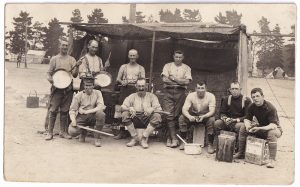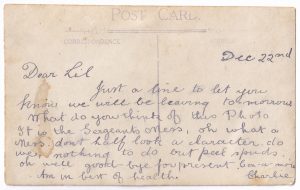[Editor: This postcard, which incorporates a photo of a group of unidentified Australian soldiers, is from the era of the First World War (1914-1918). The postcard is dated 22 December (no year is given, although it is believed to be 1914).]
Sergeants’ Mess
[Front of postcard]
[Photo of a group of soldiers, some of whom are peeling potatoes or holding pans.]
[Reverse of postcard]
[Handwritten text, in italics]
Dec. 22nd
Dear Lil,
Just a line to let you know we will be leaving to-morrow.
What do you think of this Photo? It is the Sergeant’s Mess, oh what a Mess.
Don’t half look a character, do we? Nothing to do but peel spuds.
Oh well, good-bye for present. Con-a-more.
Am in best of health.
Charlie
[No identifying information about the manufacturer was included on the postcard.]
Source:
Original document
Editor’s notes:
Dimensions (approximate): 142 mm. (width), 87 mm. (height).
This photograph is believed to be of the 16th Battalion Sergeants’ Mess, taken at Broadmeadows in 1914.
Charlie = a diminutive form of “Charles”
con-a-more = (Italian) con amore (meaning “with love”), especially used as a direction for music (for a piece of music to be performed lovingly, or expressing love); with devotion, with gentleness, with tenderness, with tender enthusiasm; with enthusiasm, with zeal
Lil = a diminutive form of “Lilian”, “Lillian”, or “Lily”
mess = a building, hall, room, tent, or structure on a military base, or in a military encampment or environment, in which members of the military can have their meals (the location may also be used for gatherings, and for purposes of recreation or relaxation), similar to a dining hall (the term may also be used by non-military organisations, such as Scouts and Guides)
spud = (slang) potato; plural: spuds (potatoes)
[Editor: For ease of reading, the original text has been separated into paragraphs, and punctuation has been inserted as deemed appropriate.]


Leave a Reply